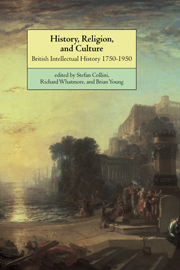Book contents
- Frontmatter
- Contents
- Preface
- General introduction
- Presentation of History, Religion, and Culture
- Part I
- Part II
- Part III
- 8 The politics of anatomy and an anatomy of politics c. 1825–1850
- 9 Images of time: from Carlylean Vulcanism to sedimentary gradualism
- 10 ‘Race’ and ‘nation’ in mid-Victorian thought
- 11 Political thought and national identity in Britain, 1850–1950
- List of contributors
- Acknowledgements
- Index
11 - Political thought and national identity in Britain, 1850–1950
Published online by Cambridge University Press: 03 December 2009
- Frontmatter
- Contents
- Preface
- General introduction
- Presentation of History, Religion, and Culture
- Part I
- Part II
- Part III
- 8 The politics of anatomy and an anatomy of politics c. 1825–1850
- 9 Images of time: from Carlylean Vulcanism to sedimentary gradualism
- 10 ‘Race’ and ‘nation’ in mid-Victorian thought
- 11 Political thought and national identity in Britain, 1850–1950
- List of contributors
- Acknowledgements
- Index
Summary
Historians continue to find rich pickings in British political thought in the decades enclosing the turn of the nineteenth century. As a result, the forces which invigorated it and the characteristics it assumed have become increasingly clear. A key factor was the growth of government intervention in spheres of society that had been ordered on a largely spontaneous basis hitherto. This provoked much dispute on the merits of such action. Correspondingly, interest in the concept of the state itself was greatly enhanced, particularly the moral purposes of which it was thought to be the highest expression. Political speculation was intensified further by successive extensions of the franchise. These concentrated the minds of political thinkers on the rights and duties associated with citizenship, the social conditions with which its ‘spiritual’ foundations would best accord, and the role of the state and other organisations in its institutional expression.
However, an additional (although relatively neglected) impetus to political thought derived from the resurgent English/British national consciousness of the mid-nineteenth century onwards. As well as underlying the establishment of such key cultural institutions as the National Portrait Gallery (1856), the Oxford English Dictionary (1879), the Dictionary of National Biography (1882), and the Royal College of Music (1883), English nationalism inspired a host of major and minor works across a broad spectrum of political belief.
- Type
- Chapter
- Information
- History, Religion, and CultureBritish Intellectual History 1750–1950, pp. 245 - 269Publisher: Cambridge University PressPrint publication year: 2000
- 7
- Cited by

